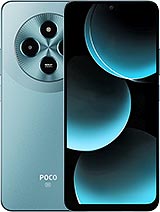Oppo K13x alternatives
Tap above to see alternatives.
Poco M7 alternatives
Tap above to see alternatives.
2x2.4 GHz Cortex-A76
6x2.0 GHz Cortex-A55
2x2.2 GHz Cortex-A78
6x1.95 GHz Cortex-A55
6GB 128GB (UFS 2.2)
8GB 256GB (UFS 2.2)
8GB 128GB (UFS 2.2)
OmniVision OV50D, f/1.8, (wide), PDAF
2 MP,
f/2.4, (Mono)
f/1.8, (wide), 1/2.96", PDAF
GalaxyCore GC08A8, f/2.0, (wide)
f/2.0, (wide)
SIM1: Nano, SIM2: Nano (Hybrid)
SIM1: Nano, SIM2: Nano
9 5G bands
n1, n3, n5, n8, n28, n40, n41, n77, n78
16 5G bands
n1, n2, n3, n5, n7, n8, n20, n26, n28, n38, n40, n41, n48, n66, n77, n78
In this performance comparison, the Poco M7 with its Qualcomm Snapdragon 4 Gen 2 (4nm) performs better than the Oppo K13x with the Mediatek Dimensity 6300 (6nm), thanks to superior chipset efficiency.
Both phones offer the same 2 years of OS update support. For security updates, Poco M7 offers 4 years of support compared to Oppo K13x's 3 years.
Both Oppo K13x and Poco M7 use LCD screens. Both smartphones offer the same 120 Hz refresh rate. Oppo K13x also boasts a brighter screen with 1000 nits of peak brightness, enhancing outdoor visibility. Both phones have the same screen resolution.
Oppo K13x comes with a larger 6000 mAh battery, which may offer longer usage on a single charge. Oppo K13x also supports faster wired charging at 45W, compared to 18W on Poco M7.
Oppo K13x offers better protection against water and dust with an IP65 rating.
¹ Scores can vary even with the same chipset due to RAM, thermals, and software optimization.












